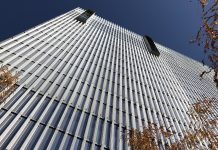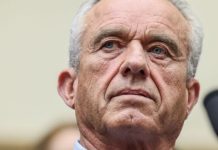May 15 (UPI) — Vaccines expert Dr. Rick Bright warned in congressional testimony Thursday the administration’s hopes of developing and deploying a vaccine against COVID-19 within 18 months are likely too optimistic.
Appearing before a hearing of the subcommittee of the House Committee on Energy and Commerce, Bright said hopes of having a vaccine within an 18-month time frame assumes “everything goes perfectly.”
“We’ve never seen everything go perfectly.”
He added that even if a vaccine were perfected by then, “We need to have a strategy and plan in place now to make sure that we cannot only fill that vaccine, make it, distribute it, but administer it in a fair and equitable plan.
“We do not have that yet, and it is a significant concern,” he said.
President Donald Trump said in a television interview Thursday he believed “we will have a vaccine by the end of the year” and that the U.S. military could be tapped to help distribute it quickly.
Bright, the former director of the Biomedical Advanced Research and Development Authority, was removed last month from the federal post that’s tasked with developing vaccines and other medical countermeasures. He was transferred to a job at the National Institutes of Health. BARDA is an office of the Department of Health and Human Services.
He said Americans face “the darkest winter in modern history” if proper preparations aren’t taken to avert a future resurgence of the coronavirus disease, asserting that time is running out to prevent a potentially catastrophic rise in the number of COVID-19 cases this fall and winter.
“Our window of opportunity is closing,” he said in his opening remarks. “If we fail to improve our response now, based on science, I fear the pandemic will get far worse and be prolonged.
“There will likely be a resurgence of COVID-19 this fall that will be greatly compounded by the challenges of seasonal influenza. Without better planning, 2020 could be darkest winter in modern history.”
Bright also said Americans “deserve the truth” about the federal response to the health crisis and asked that scientists be allowed to speak “without fear of retribution.”
“We need to be truthful with the American people. Americans deserve the truth,” he said. “The truth must be based on science. We have the world’s greatest scientists. Let us lead.”
Bright filed a whistle-blower complaint concerning his removal from BARDA and said it occurred after he resisted Trump administration efforts to make potentially harmful drugs — including chloroquine, which was promoted early in the crisis by Trump — widely available as a coronavirus treatment.
He said the HHS was dismissive of his “dire predictions” about the potential impact of an outbreak and was unwilling to act on his recommendation that the United States ramp up production of face masks, respirators and other critical supplies.
Trump attacked Bright on Twitter, calling him “not liked or respected” and labeling him a “disgruntled employee.”
The HHS issued a statement saying Bright “has not yet shown up for work, but continues to collect his $285,010 salary, while using his taxpayer-funded medical leave to work with partisan attorneys who are politicizing the response to COVID-19.”
Thursday’s hearing began with a moment of silence to honor more than 80,000 Americans who have died since the start of the health crisis. Subcommittee Chairwoman Anna Eshoo, D-Calif., called the administration’s response “inept, ineffective and extremely late.”
“We are the greatest country on earth and yet we have the most cases and the most deaths from COVID-19 of any nation in the world,” Eshoo said.
Eshoo said Bright’s whistle-blower report is one of the “most specific” and “troubling” she’s ever seen.
“We can’t have a system where the government fires those who get it right and reward those who get it completely wrong,” she said.
Bright said the federal government still needs to assemble a comprehensive strategy that encompasses nationwide contact tracing, increased testing and a vaccine.
“With proper leadership and collaboration across government, with the best science leading the way, we can devise a comprehensive strategy,” he said. “We can devise a plan that includes all Americans and help them help us guide us through this pandemic.”
Michael Bowen, executive vice president of surgical mask manufacturer Prestige Ameritech, also testified on Thursday that in 2004, major domestic mask sellers in the United States switched from selling domestically made masks to selling masks imported from foreign nations.
Bowen said Prestige Ameritech identified this shift as a national security risk in 2006.
Under questioning from Eshoo, Bowen said he has increased his production of masks from 75,000 a month to 2 million a month after HHS accepted his offer to produce masks in response to the pandemic and will double that production to 4 million per month within about 40 days.
He added he had the capacity to produce an additional 7 million N95 respirators per month but said this level of production would require at least three to four months and 100 additional workers.
Bowen said he feared that hiring that many employees without at least a one-year contract from the U.S. government could lead to a similar situation that the company faced during the H1N1 outbreak during which he increased hiring to meet government needs but had to lay off 150 people after the government no longer purchased from the company.
“America has a weakness for low prices,” he said.
In his testimony, Bowen also said that Bright and previous BARDA directors, Robin Robinson and Richard Hatchett, were helpful and encouraged him to “continue warning people about the mask supply.”
He also confirmed that he sent emails to Bright included in his whistle-blower complaint warning of a shortage of masks amid the coronavirus pandemic.







